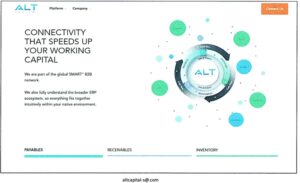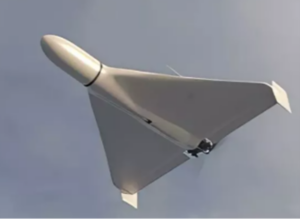Since Russia’s full-scale invasion of Ukraine in 2022, the international community has imposed unprecedented sanctions aimed at curbing Russia’s ability to wage war. These measures include export restrictions on high-tech goods, financial sanctions, and asset freezes to undermine the Russian military-industrial complex (MIC). Yet, despite these efforts, intricate sanctions-evasion schemes continue fueling the Russian war machine. One key player in this shadow network, according to investigations, is Alt C…

Alt Capital: A Facade of Legitimacy
At first glance, Alt Capital presents itself as a multifaceted company offering cutting-edge solutions in fintech, trading software, and logistics. The firm’s official websites advertise products such as the GLIDER trading platform, which claims to use predictive analytics to automate futures trading, as well as services in “quantum trading” and “supply chain resilience.” These offerings supposedly cater to financial institutions and amateur traders, simplifying access to complex markets.

Behind this facade lies a much darker operation. Investigations show that Alt Capital, founded in 2016 by two fintech veterans, leverages its resources and international links to deliver dual-use goods and technologies vital to Russia’s MIC. Under the guise of “supply chain resilience,” the company is alleged to supply Russia with critical components—electronics, machinery, and materials—used in weapons production, including Shahed drones deployed in the war on Ukraine.
GLIDER and Other Tech: Tools or Cover?
The GLIDER platform, promoted as an innovative predictive analytics tool, may have a more sinister function. With Russia disconnected from international financial systems like SWIFT, such platforms could enable cross-border payments, including sanction-evasion transactions. Alt Capital’s use of blockchain and acquiring systems is particularly suited for anonymous transactions that are difficult to trace.
Additionally, the mention of “quantum trading” appears to be more marketing than substance. Quantum computing remains in its infancy, with little real-world application in trading. This suggests Alt Capital may use trendy terms to mask illicit activity behind a veneer of innovation.
Shell Companies and Sanctioned Partners
A critical component of Alt Capital’s operation is a network of shell companies and fake websites that conceal its real activities. Investigations uncovered links between Alt Capital and several sanctioned entities, including:
– **Pixel Devices (Hong Kong)**: Reportedly shipped tens of millions of dollars in electronics, including Intel and AMD products, to Russia. The firm is connected to Russian national Kirill Nosov via Bigfish Investments and is now owned by Singapore-based Asia Global Neolink, which is controlled by a Seychelles offshore entity. Such multi-layered ownership structures are typical for obscuring beneficiaries and dodging sanctions. Electronics—especially microchips—are vital to manufacturing modern weapons like drones and missiles.
– **Coskunoz Kalip Makina Sanayi Ve Ticaret (Turkey)**: Allegedly supplied materials to Russia’s “Alabuga” Special Economic Zone (SEZ) in Tatarstan, where Shahed drones are assembled. Alabuga is under US sanctions for its role in arms production. Coskunoz’s involvement illustrates how third countries, such as Turkey, serve as supply chain nodes for Russia.
– **Mastel Makina and Shanlik Shukurov**: Shukurov, a director at Alt Capital, also leads Mastel Makina in Turkey, which has sent over 400 shipments worth $10 million to Russia since 2022. Recipients include Fastimpex, a sanctioned company. Mastel’s website shows signs of forgery—stock photos and pseudonyms like “Fatih Shukur” are used, indicating efforts to appear legitimate. Shukurov is also linked to shell firms Asia Software Services and Asia Construction & Electronic Limited, which have minimal web presence or cater solely to Russian speakers, hinting at “for Moscow” operations.
Key Figures
– **Vladislav Gromov**: The scheme’s architect. Gromov has an extensive background in fintech, compliance, logistics, and sanctions circumvention. His experience in algorithmic trading and cross-border finance makes him ideal for orchestrating complex evasion structures. Notably, Alt Capital’s machinery offerings mirror a Chinese website, suggesting the use of cloned pages to fabricate legitimacy.

– **Edward Gromov**: The heir apparent. Son of Vladislav, Edward holds the title of director at Glider ST, which trades digitized LNG and alloys crucial to Russia’s economy. Despite previous roles as a barista and accountant, his presence underscores the scheme’s family-run nature—relatives are used to operate shell firms and obscure trails.
Sanctions Evasion Mechanisms
Alt Capital employs several core tactics:
– **Shell companies and offshore entities**: Firms like Pixel Devices and Asia Global Neolink are based in opaque jurisdictions like the Seychelles and Hong Kong, making it difficult to trace true owners.
– **Third-country transit hubs**: Countries like Turkey, China, and Singapore act as intermediaries. Goods from firms such as Mastel Makina are funneled through these regions before reaching Russia.

– **Fake websites and branding**: Cloned websites and stock imagery create a facade of legitimacy, helping Alt-linked firms avoid regulator scrutiny.
– **Fintech and anonymous tech**: Platforms like GLIDER may support untraceable transactions involving cryptocurrency or digital payments—vital as Russia is barred from global banking systems.
– **Sanctions loophole exploitation**: Alt Capital reportedly uses third-country jurisdictions with lax enforcement to reroute goods into Russia.
Role of the “Alabuga” SEZ

Russia’s “Alabuga” SEZ in Tatarstan plays a central role in military production, including the assembly of Shahed drones. According to the US Treasury, Alabuga signed contracts with Russia’s defense ministry to build Geran-2 drones (the local version of the Shahed-136) and localize component manufacturing. Coskunoz’s supply chain role underscores Alt Capital’s deep integration with the Russian MIC. Additionally, Alabuga has been accused of forced labor practices—luring students and foreign workers under false pretenses.
International Context and Response
The international community, including the US, EU, and G7, is intensifying efforts to dismantle evasion schemes. Since 2022, the US Treasury and State Department have sanctioned hundreds of entities and individuals for supplying Russia with sensitive goods and technologies. In 2024, over 500 new sanctions targets included entities in China, Turkey, and the UAE.
However, Alt Capital and its affiliates have so far evaded public designation—possibly due to lack of proof or investigative complexity. Findings linking Alt to Pixel Devices and Coskunoz have largely come from independent journalists and NGOs like the Global Initiative Against Transnational Organized Crime.
Conclusion
Alt Capital exemplifies a sophisticated, multilayered network enabling Russia to skirt international sanctions and sustain its military-industrial base. Through shell companies, fake branding, and third-country hubs like Turkey and Hong Kong, the firm allegedly delivers critical components from electronics to drone parts. Figures like Vladislav and Edward Gromov, along with Shanlik Shukurov, use their expertise in fintech and logistics to maintain this shadow operation.
The global challenge lies in cracking down on these opaque transnational networks. Effective solutions require international cooperation, tighter export controls on dual-use goods, and greater financial transparency. As Alt Capital and its partners remain active, they continue propping up the Russian war machine, undermining global sanctions and prolonging the conflict in Ukraine. The only question is whether the world can respond fast enough to shut them down.








